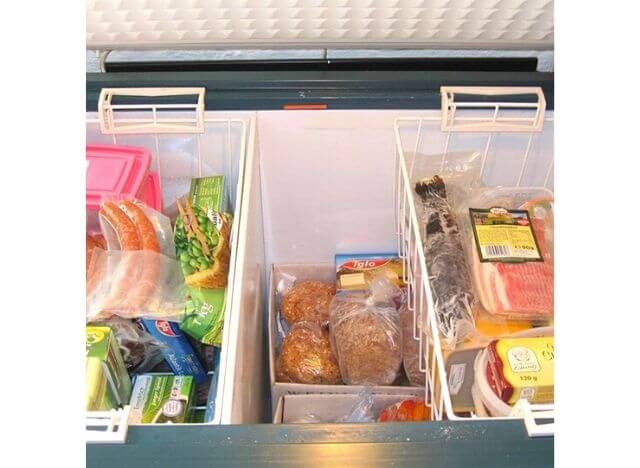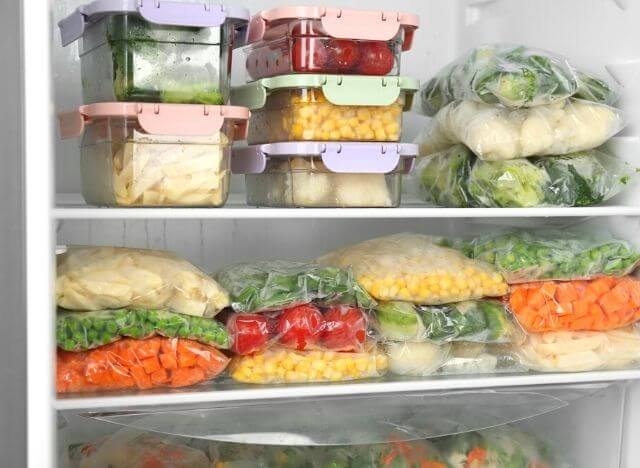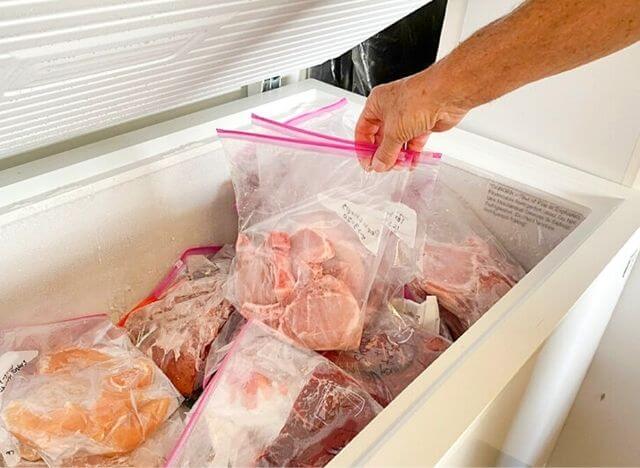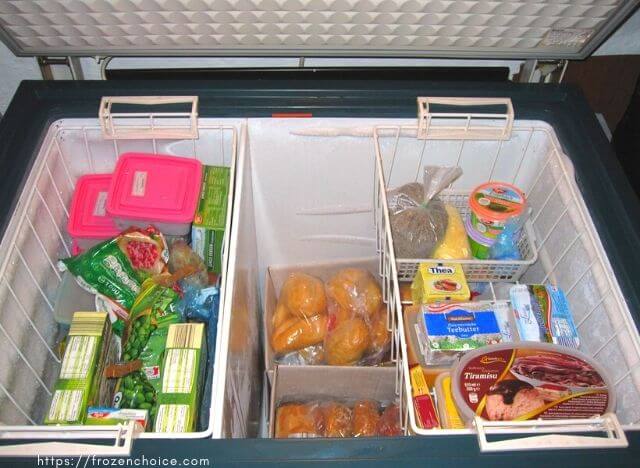In modern life, most people choose to preserve frozen food and use it gradually. Storing food on time and properly not only helps our food keep its fresh taste, but also limits unwanted consequences from using expired products. So how long can you keep frozen food in the freezer?
Golden rules for freezing food
To prevent the risk of getting out of control in freezing food, you should know the principles of food freezing right from the start. Remember that when you freeze food, you should keep these five principles in mind:
- Avoid freezer burn
- Prevent moisture loss
- Use the freezer space wisely
- Prevent odors from transferring to other foods
- Prevent food poisoning when you freeze food
The key to accomplishing these goals lies in how you store your food.
Here are the golden rules for implementing the above principle:
- Wrap meat and baked goods tightly with foil before you place them in the freezer bag. Or use small food containers – with a capacity of no more than 4 liters.
- Leave as little air in the freezer compartments as possible, by removing all the air from the freezer bags before you seal them. You should use freezer-safe containers that are appropriate for the amount of food to be frozen.
- Do not put hot food in the freezer, you should let it cool down. Also, divide the food into smaller and shallower boxes.
- Pack or put in a bag then label it or simply write the date of freezing on it.

How long can you keep frozen food in the freezer?
All food stored in the freezer has an expiration date, we need to pay attention to the shelf life of food when stored in the freezer to protect the health of family members.
If you still want to keep fresh food in the freezer, try to use them as soon as possible to ensure quality.
Kinds of meat
- Fresh beef –Up to 2 months storage time
- Goat meat (fresh) –Maximum storage time 3 months
- Fresh pork –Up to 3 months storage time
- Frozen poultry –Up to 3 months
- Fresh poultry meat –Up to 3 months
- Sausage –Storage time up to 6 months
You may also like: Is It Safe to Eat Freezer Burned Meat or Fish?
Seafood
- Frozen fish (vacuum sealed) –Storage time up to 1 year
- Fresh fish – Maximum storage time 2 to 3 months
- Shrimp – Storage time 3 to 6 months
Fruits and vegetables
- Frozen fruit and Fruit purees – Up to 6 months storage time
- Fresh potatoes and vegetable purees – Storage time 5 to 6 months
- Unblanched vegetables – 3 months
- Blanched vegetable – 12 months
Drinks
- Milk storage time up to 3 – 6 months
- Juice (homemade) up to 6 months storage time
- Fruit juice (manufacturer) maximum storage time 12 months
- Yogurt will last up to 1-2 months
Other food
- Cheeses is safe in the freezer for 6 to 9 months
- Soft cheeses: opened for 3-4 weeks, unopened: 6 months
- Salted butter– up to 12 months
- Unsalted butter- up to 6 months
- Ice cream – 6 to 12 months
Note:
- Keep your freezer at the proper temperatures. It’s best to adjust the refrigerator temperature at or below 40° F (4° C). For the freezer, the temperature should be 0° F (-18° C)
- Remember, these time frames are just estimated. If you see any abnormal such as discoloration (it can white or grayish-brown spots) or crystal formations on the surface of your food items, you should check right away and you may discard it if necessary.

Foods that should not be frozen
Some foods you should not put in the freezer because they will produce bacteria and degrade food, if you intentionally use them, you will get sick. Instead, you can use containers and store food in the freezer.
- Hard-boiled eggs
- Coffee
- Mayonnaise
- Sour cream
- Pudding
- Salad
- Rice
- Spaghetti (uncooked)
- Cereals
- Apple
- Watermelon
- Salad
- Potato
- Radish
- Bean sprouts
- Artichoke flower
- Carbonated drinks
Facts about freezing
- Food that is properly prepared and stored at 0° F (-18° C) in the freezer will remain safe for a long time. Cooling to 0 degrees has the ability to inactivate bacteria and mold but it does not kill them.
- Freezing does not reduce nutrients of your food. However, there is little change in the protein value during freezing process. The thawed food sometimes has a pasty texture.
- Freezer burn does not mean food is unsafe, so you can still eat the food. Because freezer burn is a food-quality issue, not a food safety issue. To avoid freezer burn, your food should be carefully wrapped in air-tight packaging or other freezer-safe containers.
- To prolong the storage duration and avoid freezer burn, your food should be vacuum-sealed, or put in bags with most of the air expelled.
- When the power is off, you should close the freezer door. A sufficiently cold freezer will keep food frozen for one to two days if you don’t open the door.
- Use the “fast freeze” function when you freeze large quantities.
- With liquid freezing, leave a little space to allow for expansion.
- To save space, use square or rectangular containers to store food.
- Remember to label containers with name, date to remind you what it is and when to use the food.
- Do not open the freezer too often.
In addition, it is recommended to use freezer thermometers to monitor and control the temperature. You should check the temperature weekly.

Further reading: Which is the Best Vacuum Sealer to Keep Food Fresh?
Effects of freezing to some kinds of food
Once being frozen for too long, there will be some changes in the quality of foods. Followings are some examples:
- Being separated: Milk, cream, custard, and meringue filings
- Contaminated because of freezing and defrosting: Home-stuffed whole poultry on carcass
- Changes in texture: Cottage cheese, cooked eggs, sour cream, yogurt, mayonnaise
- Mushy: Lettuce, cabbage, radishes, green onions, celery
- Rancid: Fried foods
- Soggy: Crumb toppings
- Watery and soft: Canned ham
- Be separated or curdle: sauces
- Whipping cream may not re-whip
Further reading: What Are the Best Cheap Freezers for Home?
Conclusion
Hopefully with the above article, housewives will have more knowledge to be able to take good care of their beloved family.
Reference
How Long is Frozen Food Good for?, mosaicfoods.com, Retrieved on Feb. 9, 2022

